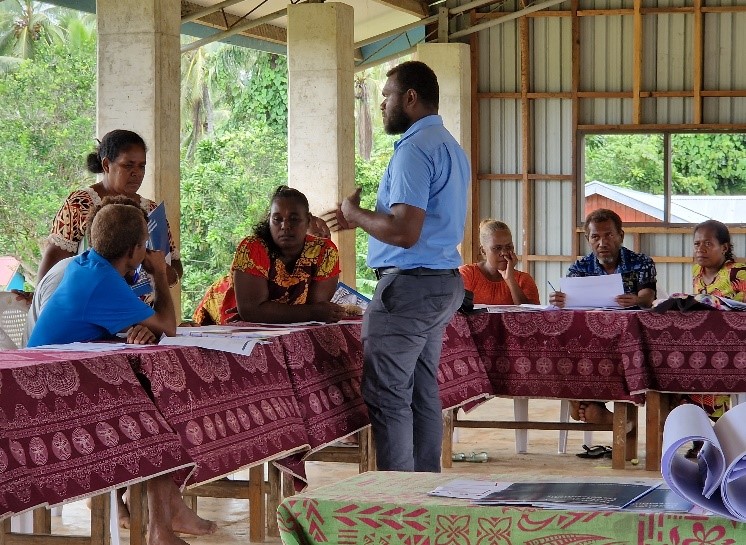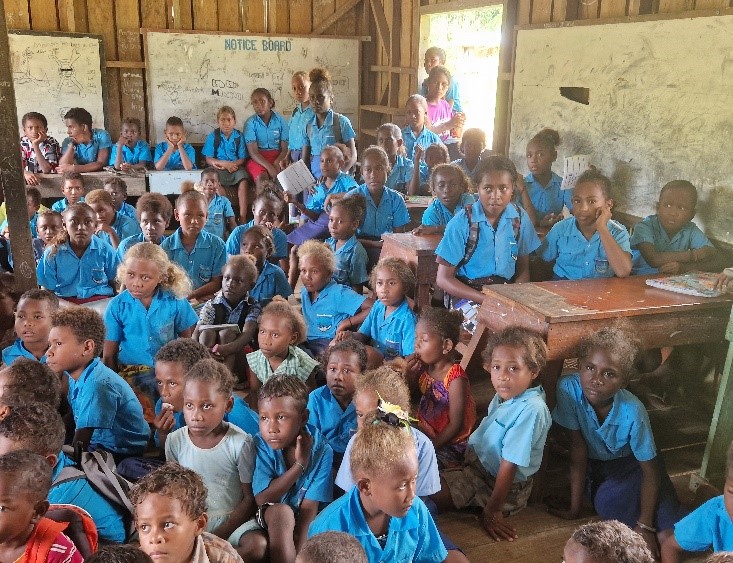

Teachers and Communities enjoying PD Workshops in Isabel province
On the 21st and 22nd of March 2023, the Ministry of Education and Human Resource Development (MEHRD) and Cognition Education met with a group of school leaders in Isabel province. The school leaders participated in the 2022 Professional Development programme, and now gathered with MEHRD and Cognition for a follow-up workshop.
The group came together in Estella Bay, not far from where the Spanish explorer, Álvaro de Mendanã, made the first European landing in Solomon Islands 555 years ago (then called Santa Isabel de la Estrella). The training was in Bolotei, in the community hall close to the primary school. 17 Teachers participated (6 women and 11 men).

Facilitator, Michael Foutaenu, with a group of teachers. Head teacher of Bolotei primary school and host, Mary Gabriel, standing on the left.
This follow-up workshop is part of a nationwide programme involving the 221 schools that participated in the 2022 PD programme. These workshops are a refresher, or follow-up, concluding the Phase I trainings that occurred during the second half of 2022.
On the first day of the training, teachers and school leaders shared the actions they had been undertaking to make changes in their teaching and school leadership. Most replied that they had carried out some of the actions advised, but were not able to carry out all recommendations, mostly due to administrative activities required at the end of the school year.

Teacher Paulo of Baolo Primary school putting training into practice: formation of small groups to discuss the different ethnic groups in Solomon Islands.
However, school leaders confirmed that adapting to a new teaching methodology takes time to become normal practice. This new methodology, where the child is more central, requires time and training for teaching professionals who are used to a more teacher-centred approach. The former approach, in which teachers mainly ‘talk-and-chalk’ has meant children and students have not traditionally had many opportunities to ask questions, nor to get actively involved in discussions or group work.
Putting the child at the centre
For this change of approach, teachers need daily support and coaching from their school leaders and the provincial education officers. PEA officers therefore need to organise more regular visits to schools to help to monitor the changes in the classroom.
This is why teachers, school leaders and EA representatives are reminded over and over of the importance of lesson planning and preparation, in the PD workshops with MEHRD and Cognition Education. Teachers need to prepare well, to achieve their desired outcomes within the limited lesson time, which is often less than 40 minutes.

Children listening to guests visiting their primary school in Baolo.
Preparation is very important, including setting lesson goals and thinking through specific learning activities aimed at achieving these goals.
How do teachers make the lessons interesting and attractive for students? How do they get children and students actively involved? Which learning materials (learner’s book), or tools (pen, marker, paper) are best to use for the lesson? How do teachers check whether the children and students have indeed learned anything? Have learners really understood the topic, or were they able to use a new skill or demonstrate a new attitude? Have learners improved teamwork skills, or been able to chair a group meeting? Have they shown growth in confidence?
Teachers have many questions to answer before a lesson begins. However, if they prepare well, they have better control over outcomes for children and students.
To change teaching practices at schools, involvement by school leaders and provincial education officers is essential. This is why teachers are always accompanied by these two colleagues in MEHRD and Cognition Education Trainings, and why the workshops are followed up by practical lesson observations by the school leader, facilitator, and provincial officers. Class observations are not meant to criticize teachers but are to help them gain confidence and give them an opportunity to demonstrate a new teaching skill. They are also to advise the teacher on what further improvements they may make.
In this way, and through the training workshops, school leaders and provincial education officers are preparing for the tasks of being coaches and advisors. They need to understand modern school instructional leadership, the importance of lesson planning, and the guiding principles that put the child central in teaching and learning. They also need to know how to coach and support teachers, how to establish more cooperation among teachers and professional learning groups. Lastly, school leaders and provincial education officers are learning about the importance of formative assessment, and preparing to coach and support teachers to do this in the classroom.
All teachers should be always in their classroom
Head teacher of Bolotei primary school, Mary Gabriel, head teacher at primary school Toelegu, Susan Koore, and teacher Maybel Lizzian, teach at primary school Kolopakisi. They confirmed that this training was very useful, with many things they could use in their classes and schools straight away. However, they say that there some things that are difficult to change with just a short workshop.
The group commented that some male teachers were not appearing in their classrooms regularly, a complaint that was repeated by parents and community members in the evening. Also, they said that many teachers had a limited understanding of the schemes of work. These examples show that it will take some time before schools are fully professional in all areas.
These aspects are why MEHRD and Cognition Education are preparing for joint monitoring visits in July. These will include classroom observations to measure changes in teaching and school practice. Provincial education officers are to organise more regular school visits and talks with school leaders to help them implement and maintain these changes, and to offer advice.
MEHRD and Cognition Education are continuing Phase I workshops, for 300 schools (in addition to 200 in 2022). By the end of 2023, almost half of primary and secondary schools in Solomon Islands will have participated in the first basic trainings on improved teaching and school leadership. Change to a child-centred methodology will be underway!
-MEHRD Press